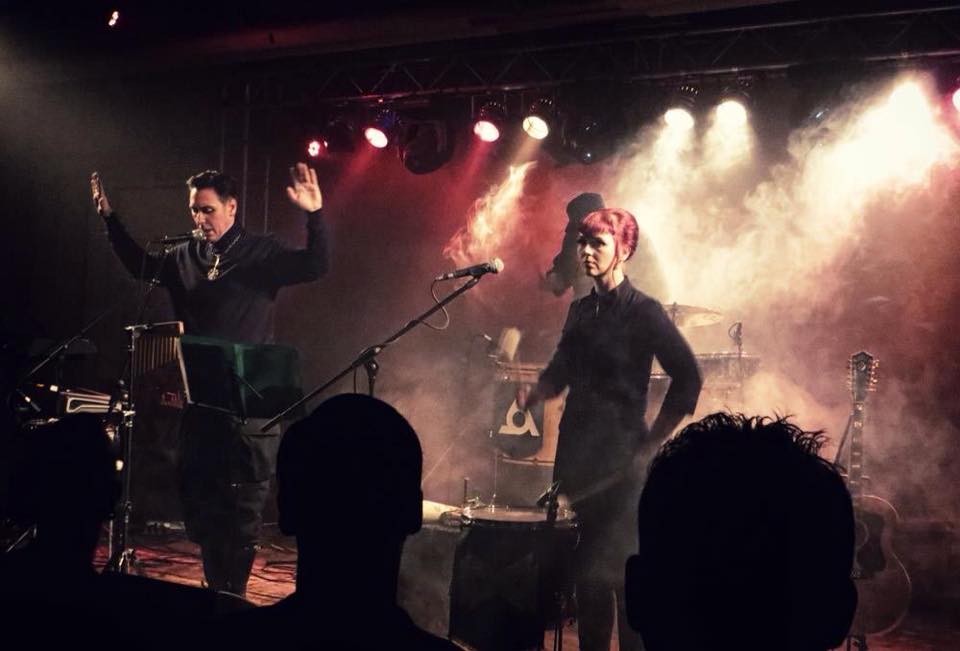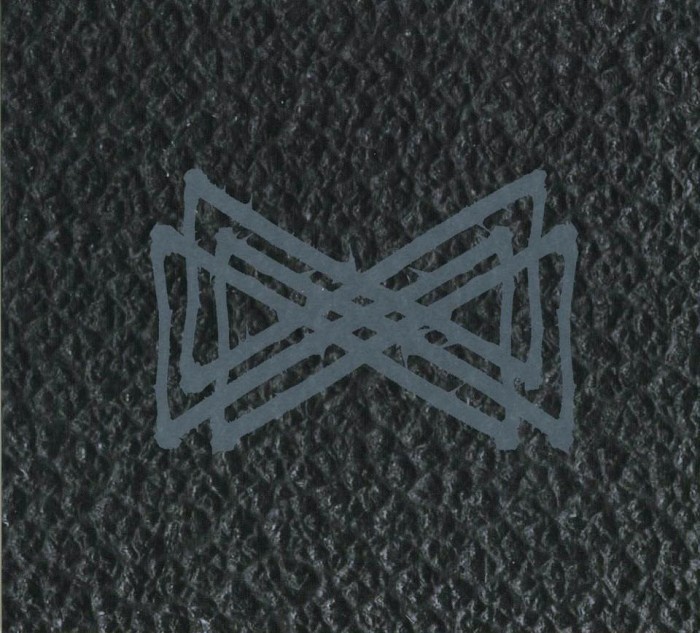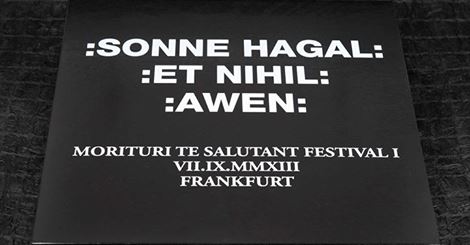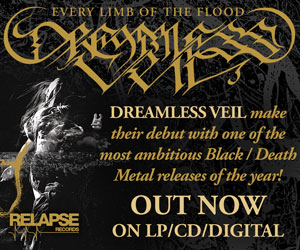Led by husband and wife duo Erin and Katrin Powell (née Katrin X), Awen hail from Dallas, a city not normally associated with neofolk or martial music. Awen’s second LP, Grim King of the Ghosts, recently came out on Old Europa Café, and it showcases a style that ranges from straightforward acoustic-guitar-and-floor-toms style neofolk to martial industrial, even dipping into dark ambient territory here and there (The LP was mentioned in December in CVLT Nation’s Top 6 Neofolk Releases of 2014).
Founded in 2003 by vocalist Erin Powell and industrial musician Eric Kristoffer, Awen’s first LP, “The Bells Before Dawn,” was released by Dais Records. Early on, Awen found themselves labelmates with acts like Psychic TV, Cold Cave, Cult of Youth, and even Italian noise pioneer Maurizio Bianchi. Last year, the band performed with Death in June on a few US dates and played in Europe with Sonne Hagal and Et Nihil during the writing and recording process of the new album.
The addition of black metal musician Wes Radvansky (of USBM band Krigsgrav) on acoustic guitar has fleshed out the feel of the band’s songs on Grim King of Ghosts, adding robusticity to the tracks. The stately, gothic church organ sound on tracks like “Tree of Sacrifice” remind me of the foreboding martial music made by Awen’s European counterparts in Wappenbund and Die Weisse Rose. There’s a vibe of stern, determined militancy throughout the course of the album, tempered by occasional poetic interludes. Singer Erin’s wife, Katrin, takes over vocals on some of the songs – most strikingly on “Cradle Spell,” a traditional ballad that imparts a neo-classical feel to the album. B9 InVid of Chicago neofolk acts Luftwaffe and Et Nihil contributes guitar both on the title track (a 12 string guitar is used there) and on the cover of Fire + Ice’s “Seeker,” later on the LP. Overall, Grim King of the Ghosts is a varied ensemble of darker folk and post-industrial styles that grew out of the 80s apocalyptic folk scene that began with UK bands like Current 93 and Death in June, bands from whom Awen trace their sonic lineage (Indeed, former Current 93 collaborator and Rune Gild figure Freya Aswynn appears on the final track of the album).
Awen’s live performances, however, tend to garner the most attention. Given the dearth of bands that sound like Awen in the North Texas area, their local live shows have mainly occurred in the experimental and power electronics/noise scenes. Awen’s shows are occultic, ritualistic; to the uninitiated, there appears to be a dash of theater. Although Erin bears more than a passing resemblance to Bryan Ferry, the Awen vocalist’s sonorous, baritone intonations would seem out of place in the glam world of Roxy Music. To the contrary, the music on Grim King of the Ghosts is a strident, heathen call to arms (“I wanted to express a kind of muscular paganism – as opposed to the neutered variety of Neo-Pagans one sees represented in over abundance; the ‘Harm None’ crowd,” Powell explained in an interview once. “I think the time has come for aggressive expression and defense of Pagan ethos”).
I recently asked Erin about the making of “Grim King of the Ghosts” and what else has been going on with Awen recently.
Awen was interviewed by Oliver.
Awen have been around a long time now, at least 12 years. What do you think accounts for the longevity of Awen and why does the band seem to play out so infrequently? Are the two related?
ERIN POWELL: From the beginning, Awen was not conceived of as a gigging band. We’ve actually done more shows than I initially anticipated, which I think is a good thing; almost all the concerts we’ve participated in have been the result of direct requests. This also explains to a certain degree why there haven’t been more! With the type of performance and sound that we bring, it’s been difficult in Texas to be on a complementary billing, though this seems to be changing within the past few years. I’ve noticed more dark experimental acts cropping up and an embrace of the ’80s Industrial aesthetic is on the rise.
I think the fact that we have not done heavy bouts of touring or ‘every weekend’ local shows has been beneficial to the longevity of the project thus far, as I understand from others that those experiences can wear on the interpersonal dynamics of a group. That said, we’re gearing up to do more live performances abroad next year. I think at this stage we’re solid enough and ready for it.
With Grim King of Ghosts, I notice there are a lot of similarities in the track/song titles — “Grim Grey King,” “Grimmigen Grauen König,” etc. This leads me to believe it’s a concept album of sorts. What is the concept?
ERIN: I do consider this a type of concept album, as the majority of the subject matter revolves around the Grim King and his court of spirits or in general the tenuous cord that separates the living from the dead, and the idea that the ancient and modern can meet on the same plane – Then and Now are One. The theme of the Grim King was inspired by the traditional 17th century English tune “Grim King Of the Ghosts,” also known as “The Lunatick Lover,” which I expanded upon in the poem I wrote at the beginning of the album to include the concept of the Grim Grey King as a cold custodian of souls, ruling over a vast court of spirits, jealous of life. This character is an archetype that shares many elements of ancient deities, shifting in the same manner as faces change in flickering candlelight. Other lyrical themes on the album involve the balance or imbalance between life and death, the nature of Sacrifice, and the necessity of accountability, purpose, and community participation in meting out capital punishment (“Humble Hempen Cord”, “Tree Of Sacrifice”, “Bitter Augur”), and the bittersweet experience of the Scottish diaspora, longing for the connection to their kin and homeland so far away while making a new life in the beauty of the Americas (“Sons Of Exiles”, “Cradle Spell”). That can be expanded to encompass the ennui of many in the world today who feel severed from their roots.
How has the Awen lineup changed over the years and what are some of the additions on this release, member-wise or instrument-wise, that weren’t there on previous Awen releases?
ERIN POWELL: Originally, the project consisted of just myself and Eric K. He’s become less involved by necessity of demands in his personal life, which is understandable. This album sees the addition of new members Wes Radvansky (guitar and composition) and Glenn Bailey (bagpipes). Wes has proven himself to be an outstanding contributor. Glenn was a friend of ours for years, and I’m glad to be able to involve him and the bagpipes on this album. There’s something about the eerie sound of the pipes that makes the hairs stand up on the back of the neck for me, like no other instrument. Katrin has had a stronger role in these recordings, singing and recording percussion; this reflects our live performances. This album also sees Per Nilsson (from Sweden) becoming more involved in the recording and creative process, and even contributing vocals in Swedish on one track! Of course we have several vital guests on this album: B9 InVid (Et Nihil, Luftwaffe) contributes an amazing performance on 12-string guitar for the title track, as our conversation about interpreting this song was the seed of the album. He also contributed the bulk of the music for the collaboration with me on our version of the Fire + Ice song “Seeker” (which was sanctioned by Ian Read).
Gaya Donadio (a.k.a. Hagshadow) from AntiChildLeague was gracious enough to contribute an Italian translation and performance of my original poem for the track “Il Re Grigio Cupo.” Freya Aswynn closes the album with a section of a personal rune reading that she performed for me several years ago in London. A key life moment for me.
You’ve been in the neofolk/post-industrial scene for awhile now. What are some of the changes you’ve noticed over the years and do you have any observations on the newer crop of bands? I think of Awen as being a band that ties the old experimental industrial and apocalyptic folk milieu in with the modern, almost revivalist type scene that seems to be sprouting up now. Do you think that’s a fair assessment?
ERIN POWELL: I do think of us as being more of a ‘roots’ based Post-Industrial project, for what that’s worth! No names, but I have noticed a trend with many bands identified as Neofolk or Post-Industrial lately sliding back toward rock n’ roll. One of the exciting things to me about this sound was the fact that it took several leaps away from that world. Of course, the artists that are choosing to do this could be returning to their own ‘roots’ and incorporating that sound as a legitimate expression of their interests, and I don’t seek to judge them, but in my personal view I am wary of it becoming ‘just entertainment.’
How has working with your new label, Old Europa Café, been?
ERIN POWELL: Our experience with Dais was great, and I still have some communication with the label owners (lately when I’ve been purchasing their other titles!). Old Europa Cafe has been very accommodating to work with on this album and The Muskets record, and it’s my hope that the record does well and opens new doors for us in the European market, which is a key demographic for us.
Do you have any specific future plans right now? I think I heard something about playing in 2015 with King Dude and Cult of Youth….?
ERIN POWELL: We’ll soon start the recording process again for another album, and we’re working on an Awen split release with Glenn’s bagpipe project, DRONE. Onwards and Upwards!
In the US, Awen’s Grim King of the Ghosts is available from Triskele’s webstore, here.
In Europe, Grim King of the Ghosts is available from Old Europa Cafe, here.
Awen have a Facebook page here.













